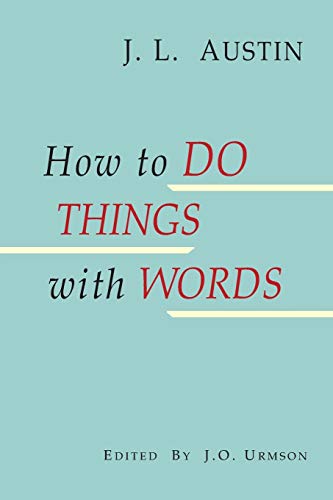


How to Do Things with Words
O**N
A must read for any student of language
How to Do Things With Words elevated my understanding of language and interpretive skills. As a historical researcher, finding the tools to allow deeper analysis is the key to good scholarship. I have read countless books and articles that attempt to apply Austin’s theories to their work and for the most part, they do a great job. However, their explanation of how they use his framework is often difficult to understand as they overcomplicate considerably basic concepts. I do not mean to imply that his theories or ideas are simple, but the way he explains them, makes sense, and creates many forehead slapping moments as you wonder why you did not see the connections he made.Much like Ludwig Wittgenstein’s Tractatus Logico-Philosophicus, when you go back to the original creator of theoretical linguistic frameworks, their ideas are clear and well thought out. They only become difficult when “scholars” explain it in their jargon and overcomplicate ideas that the original author thought were self-apparent. Please read this book if you want to know how people use language without realizing it, and what implications they create in both their choices and structure of discourse.
F**N
An interesting basic premise, worked to pieces
Austin's basic idea is that, regardless of what some philosophers have claimed, language does not consist exclusively of descriptive factual statements that can be classified as "true" or "false". He points to what he calls "performative" statements, which accomplish actions rather than make propositions about things. An example would be someone making wedding vows: "I do" is not descriptive but rather an action necessary to complete the act of marriage. This is an interesting point, and I thought he would use it as a take-off point for some broader observations about language as action in general.But no such luck. Instead, he slices and dices, parses and packages, categorizes and subcategorizes all the possible dimensions of his initial observation until the reader is left with a heavily worked system that seems to be spinning inside itself. I can't say that I've gained much insight into language in general from reading the book. That may be beyond its scope (it's based on a series of lectures), and that's fine, but I don't see the point of engaging in so much intellectual energy for something of such limited value.
A**R
first edition
this is the original edition of printed version of a speech given by Austin, who is best known for the development of the theory of "Speech Arts." A later edition was published, but this one is quite useful still
S**A
repetitive to the point that it is unreadable
in introduction you find all chapters described in detail, then again in the beginning of part, then again in the beginning of each chapter, then there is "how to read and work with the chapter". Then I lost it, sorry.
C**R
So happy to have this.
Very clean copy, cheers
R**A
Book That Wasn't Engaging
As well as majoring in English Literature in college, I enjoy writing as a hobby. When I purchased this book, I thought it would enhance my writing skills. Despite having looked inside the book and skimming it before buying it, I was disappointed. As I read the book, the words seemed fragmented, and the overall picture was not cohesive. I found this book difficult to read, however others may enjoy it.
M**A
Un must have.
Anche se non sono madrelingua inglese ho voluto comprare la versione originale. Austin è un must have per tutti gl amanti della linguistica e più nello specifico per chi come è ama la pragmatica e vuole scoprire cosa noi possiamo fare con la lingua (molto più di quello che pensiamo).
M**E
Very Good Practical Know How
Very Good Practical Know-How. A quick easy book to skim through to get to the gems.
Trustpilot
1 day ago
3 weeks ago